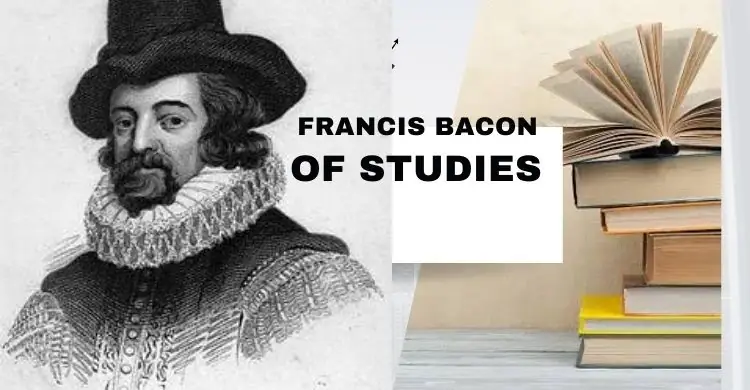Of Studies by Francis Bacon Questions Answers
(1) What is the meaning of the line “natural abilities are like natural plants”?
Ans: The quoted line taken from Sir Francis Bacon’s “Of Studies” indicates the relative merits of studies and experience through the metaphor of gardening. The natural growth of plants in a garden should be cut to proper size and shape by continual pruning. But this will not be enough. The garden has to be properly bounded and walled and the plant-beds be delimited in order that it tends to beauty as well as utility.
Similarly man’s natural abilities should be pruned by studies and guided by experience and observation. So if studies are like pruning of plants, experience and observation are like the effective steps to make the garden beautiful as well as useful.
(2) What does the line suggest – “Some books are to be tasted, others to be swallowed, and some few to be chewed and digested.”
Ans: The quoted line taken from Sir Francis Bacon’s “Of Studies” indicates the ways of studying different types of books through the metaphor of eating. When plates are laid and a number of courses are provided for eating, some of the items of food are merely for tasting, for example appetisers, some for swallowing, for example the prophylactic items and some others are the staple dishes which need to be properly masticated and digested.
Similarly, there are three gradations of books. Some books, not of much importance, are to be read partially. Some other books which cover some important items, but rather difficult and dull to read, are to be somehow grasped and learned so as to use this appropriately. But really valuable and enjoyable books are to be read diligently and attentively to gain both knowledge and pleasure.
(3) What is the explanation of the line “Distilled books are like distilled water….”
Ans: Through the quoted lines taken form his essay “Of Studies”, Francis Bacon expresses his disapproval of abridged or extracted reading with the help of a deputy. He opines that this type of reading can be allowed in case of unimportant books. He characterizes this type of books as distilled books and compares them to distilled water.
Natural water is tasty and enjoyable, but distilled water is rather tasteless or ‘flashy’ and hardly quenches human thirst for knowledge. In the same way the extract or abridgement of an original work lacks taste or beauty and never gives a through knowledge.
(4) What does the expression mean “Abeunt studia in mores”?
Ans: The quoted phrase taken from Sir Francis Bacon’s essay “Of Studies” is one of the epistles of the Roman poet, Ovid. It means “the natural pursuits become character.” Here Bacon categorically claims that different subjects have different effects and by reading them a reader can cultivate his or her intellectual faculties.
Thus the study of history makes one wise, poetry increases the fineness of intellect as well as the aesthetic sense of the reader, mathematics increases intellectual sharpness, natural science augments depth of knowledge, the study of ethics makes one grave whereas logic and rhetoric develop the power of contention and deliberation. Thus every subject of study has an instructive effect on a human character.
Of Studies by Francis Bacon Questions Answers
(5) “every defect of the mind may have a special receipt” – What does the line suggest?
Ans: Through the quoted line taken from his essay “Of Studies”, Sir Francis Bacon asserts that different types of studies are well capable of removing different intellectual deficiencies. Intellectual exercises are possible through studies and they are as much useful as physical exercises.
An unmindful person should study the mathematics, person having no ability to distinguish should study philosophy and theology, a person having an unnecessary mental agility should study the reports of the cases and causes fought by the lawyers. Thus Bacon here specifically claims that whatever may be the nature of the mental deficiency, it can be removed definitely by the study of the appropriate subject or subjects.

(6) What is the prose style of Sir Francis Bacon?
Ans: In his essay, “Of Studies”, Sir Francis Bacon adopts a prose-style which is totally different from the highly ornamental, brooding or meditative prose-style of late sixteenth and early seventeenth century prose-writers like Lyly, Sidney, Thomas Browne who took as their model the copiousness of Ciaro.
Bacon follows highly epigrammatic, antithetical and crisp style based on the style of Tacytus and Seneca. This aphoristic style gives a peculiar effect of concentration and compactness. In this respect Bacon’s essay is totally different in style and none from Montaigne’s essays which were essentially subjective and highly personal, while in Bacon there is very little that is confessional or subjective.
(7) What according to Francis Bacon are the different modes of study and how do they help a man?
Ans: According to Francis Bacon, the different modes of study are reading, discussion of what he has read and writing. According to Bacon, reading makes one a complete man because it helps to drive away ignorance and gives him fresh ideas.
Discussion on the ideas that he derives from books provides him with the ability of using them in practical life. Therefore, it makes him a ‘ready man’.
On the other hand, writing fixes the ideas permanently in memory. Thus, he becomes an ‘exact man’.
(8) What are the disadvantages of studies as Bacon mentioned in his “Of Studies”?
Ans: According to Bacon studies provide delight, ornament and ability. But according to Bacon, one who spends too much time in studies it is possible that he may become inactive and sedentary in habits.
Another shortcomings in this regard is that one who uses learning too much for ornamentation, then it becomes artificial and overrefined.
No doubt, studies helps one with the ability of judgement, but if the judgements are always influenced by bookish rules, then he disposes scholarly eccentricity.
Of Studies by Francis Bacon Questions Answers
(9) “Studies serve for delight, for ornament, and of ability” – What does the line suggest?
Ans: The essay begins with a brilliant aphorism: “Studies serve for delight, for ornament, and for ability”, highlighting the use of studies in the life of a man. The reader is immediately made aware that studies entertain one with stories, increase the joy of learning. Studies serve for ‘ornament’ as it gives one better ability in practical affairs of life. Correct judgement as to how a work should be done systematically are learnt from books.
(10) Crafty men condemn studies; simple men admire them; and wise men use them.” – What does the line suggest?
Ans: This sentence is an extract from Bacon’s essay “Of Studies”. The men who are cunning think study to be a wastage of time and do not want to undertake the trouble of rigorous studies and often condemn them. Simple men express their admiration for studies but are unable to use them for their benefit. Thus it is only the wise men who can make the most effective use of learning.
(11) What does Bacon say about too much study in his essay “Of Studies”?
Ans: In his essay, “Of Studies”, Bacon presents a note of caution regarding the manner in which studies should be carried out. He says that “To spend too much time in studies is sloth…..is the humour of a Scholler”. One can thus be a bibliophile but never a bookworm. Neither should a man live within boundaries created by books nor should he have pretensions about his knowledge and flaunt it.
You May Like To Read More:
English Poetry
- Shall I Compare Thee To A Summer’s Day Analysis Questions Answers
- To His Coy Mistress Summary Theme
- Ode To The West Wind Summary Questions Answers
- The Moon and the Yew Tree Summary Analysis
- Dover Beach Poem Analysis Questions Answers
English Literature
- Elizabethan Sonnet Sequence Analysis
- Description of Assassination of Julius Caesar
- Riders to the Sea Questions Answers
- Shakespeare Sonnets Forms Themes Examples
- Macbeth as a Shakespearean Tragedy
English Essay
- How to Write Essay
- Essay on Importance of Discipline
- Pleasure of Reading Poetry Essay
- Essay on Environment Pollution
- Advantages and Disadvantages of Social Media
- Essay on Poverty Causes Effects Solution
English Grammar
